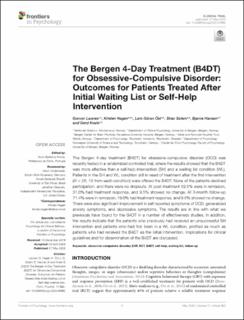The Bergen 4-Day Treatment (B4DT) for Obsessive-Compulsive Disorder: Outcomes for Patients Treated After Initial Waiting List or Self-Help Intervention
Peer reviewed, Journal article
Published version

View/
Date
2020Metadata
Show full item recordCollections
- Institutt for psykologi [3086]
- Publikasjoner fra CRIStin - NTNU [38057]
Original version
10.3389/fpsyg.2020.00982Abstract
The Bergen 4-day treatment (B4DT) for obsessive-compulsive disorder (OCD) was recently tested in a randomized controlled trial, where the results showed that the B4DT was more effective than a self-help intervention (SH) and a waiting list condition (WL). Patients in the SH and WL condition still in need of treatment after the first intervention (N = 26; 13 from each condition) were offered the B4DT. None of the patients declined participation, and there were no dropouts. At post-treatment 59.5% were in remission, 31.0% had treatment response, and 9.5% showed no change. At 3-month follow-up 71.4% were in remission, 19.0% had treatment response, and 9.5% showed no change. There were also significant improvement in self-reported symptoms of OCD, generalized anxiety symptoms, and depressive symptoms. The results are in line with what we previously have found for the B4DT in a number of effectiveness studies. In addition, the results indicate that the patients who previously had received an unsuccessful SH intervention and patients who had first been in a WL condition, profited as much as patients who had received the B4DT as the initial intervention. Implications for clinical guidelines and for dissemination of the B4DT are discussed.
